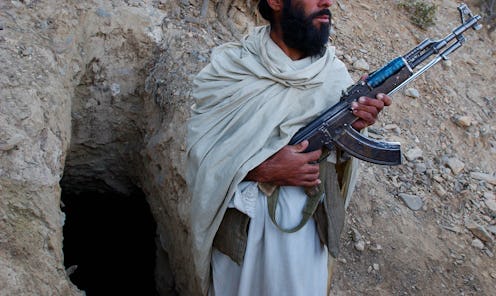News
Where Does Al Qaeda Base Its Operations?
In recent weeks and months, the media's popular conversation about terrorism has centered squarely on ISIS, the militant Islamic group that's swept through Iraq and Syria, bringing large parts of both countries tightly under their control. But now, an old standard-bearer of violent, fundamentalist extremism is stepping back into the limelight — al Qaeda in Yemen has reportedly claimed responsibility for the Charlie Hebdo massacre in France. And if that makes you curious where al-Qaeda's other branches are, well, it's not very reassuring news.
In simplest terms, al Qaeda's international terrorist network boasts six major branches, stretching from the Middle East into Africa and Asia. Its most recent addition, al Qaeda in the Indian Subcontinent, was launched in Sept. 2014. That's not to say that the new addition necessarily speaks to al Qaeda's relative strength — when the announcement was made by al Qaeda chief Ayman al-Zawahiri, many observers saw it as an effort to combat the spotlight-stealing gains of ISIS, its younger, potentially more brutal offshoot. Although ISIS does tightly control parts of Iraq and Syria, and boasts high numbers of foreign nationals amid their ranks (which has been of particular concern to the UK and France), their organization isn't as broad-based as the network that al Qaeda has built up through the years.
So, where exactly does al Qaeda base its operations? In addition to the aforementioned branches in Yemen (officially under the umbrella of al-Qaeda in the Arabic Peninsula) and India, there are three other direct affiliates:
- Al Qaeda in Syria, which has seen its territory become crowded as a result of ISIS' rise.
- Al Qaeda in the Islamic Maghreb, which presides over swaths of Northern Africa, planning operations to overthrow the government of Algeria in particular.
- Al Qaeda in Somalia, another stronghold on Africa's northeastern coast. Operating since the early 1990s, this branch eventually formed strong ties with Somalian Islamic militant group al-Shabaab, which pledged allegiance to al Qaeda in 2012.
In all, that's five total branches. The mainline branches don't account for all of their operations, however — as the Council on Foreign Relations detailed back in 2012, they're believed to have autonomous cells active in more than 100 countries. Accounting for a staggering amount of bloodshed and calamity across the Muslim world, as well as deadly attacks against Western nations, the 9/11 attacks and the 7/7 London Underground bombings are the most prominent among them.
After the harrowing attack on Charlie Hebdo, which killed 10 employees of the paper in addition to two police officers, there was still a great deal of uncertainty over who had exactly carried it out. Early reports suggested that the gunmen might have had ties to ISIS, and Friday, a number of websites in France were hacked and replaced with the ISIS flag, above the words "Death to Charlie."
According to the AP, however, an al Qaeda source claimed that they'd delayed initially taking responsibility for "security reasons," and a witness to the Charlie Hebdo shooting claimed that one of the gunmen made his affiliation clear: "You can tell the media it was al-Qaeda in Yemen."
Image: Getty Images
